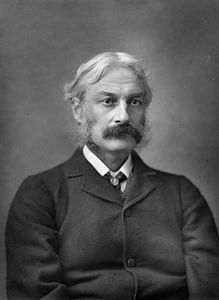Traditionary Version
Andrew Lang 1844 (Selkirk, Scottish Borders) – 1912 (Banchory)
As I came in by Dunidier,
An doun by Netherha,
There was fifty thousand Hielanmen
A marching to Harlaw.
(Chorus) Wi a dree dree dradie drumtie dree.
As I cam on, an farther on,
An doun an by Balquhain,
Oh there I met Sir James the Rose,
Wi him Sir John the Gryme.
'O cam ye frae the Hielans, man?
And cam ye a' the wey?
Saw ye Macdonell an his men,
As they cam frae the Skee?'
'Yes, me cam frae ta Hielans, man,
An me cam a ta wey,
An she saw Macdonell an his men,
As they cam frae ta Skee.'
'Oh, was ye near Macdonell's men?
Did ye their numbers see?
Come, tell to me, John Hielanman,
What micht their numbers be?'
'Yes, me was near, an near eneuch,
An me their numbers saw;
There was fifty thousand Hielanmen
A marching to Harlaw.'
'Gin that be true,' says James the Rose,
'We'll no come meikle speed;
We'll cry upo our merry men,
And lichtly mount our steed.'
'Oh no, oh no!' quo' John the Gryme,
'That thing maun never be;
The gallant Grymes were never bate,
We'll try what we can dee.'
As I cam on, an farther on,
An doun an by Harlaw,
They fell fu close on ilka side;
Sic fun ye never saw.
They fell fu close on ilka side,
Sic fun ye never saw;
For Hielan swords gied clash for clash,
At the battle o Harlaw.
The Hielanmen, wi their lang swords,
They laid on us fu sair,
An they drave back our merry men
Three acres breadth an mair.
Brave Forbes to his brither did say,
'Noo brither, dinna ye see?
They beat us back on ilka side,
An we'se be forced to flee.'
'Oh no, oh no, my brither dear,
That thing maun never be;
Tak ye your good sword in your hand,
An come your wa's wi me.'
'Oh no, oh no, my brither dear,
The clans they are ower strang,
An they drive back our merry men,
Wi swords baith sharp an lang.'
Brave Forbes drew his men aside,
Said, 'Tak your rest a while,
Until I to Drumminnor send,
To fess my coat o mail.'
The servan he did ride,
An his horse it did na fail,
For in twa hours an a quarter
He brocht the coat o mail.
Then back to back the brithers twa
Gaed in amo the thrang,
An they hewed doun the Hielanmen,
Wi swords baith sharp an lang.
Macdonell he was young an stout,
Had on his coat o mail,
And he has gane oot throw them a'
To try his han himsell.
The first ae straik that Forbes strack,
He garrt Macdonell reel;
An the neist ae straik that Forbes strack,
The great Macdonell fell.
And siccan a lierachie,
I'm sure ye never sawe
As wis amo the Hielanmen,
When they saw Macdonell fa.
An whan they saw that he was deid,
They turnd and ran awa,
An they buried him in Legget's Den,
A large mile frae Harlaw.
They rade, they ran, an some did gang,
They were o sma record;
But Forbes and his merry men,
They slew them a' the road.
On Monanday, at mornin,
The battle it began,
On Saturday at gloamin',
Ye'd scarce kent wha had wan.
An sic a weary buryin,
I'm sure ye never saw,
As wis the Sunday after that,
On the muirs aneath Harlaw.
Gin anybody speer at ye
For them ye took awa,
Ye may tell their wives and bairnies,
They're sleepin at Harlaw.
Font size:
Submitted on May 13, 2011
Modified on March 05, 2023
- 3:02 min read
- 104 Views
Quick analysis:
| Scheme | axBCa Bbde bfbg bfbg bhbh ijBC dkbk eHxh BcLJ LJic xaba fhlc AHxe AgbG lcxc lcac fgbG xcxc gcgc ifbx kfbc gxbx bbbb bjxc hfdc |
|---|---|
| Closest metre | Iambic tetrameter |
| Characters | 2,880 |
| Words | 608 |
| Stanzas | 25 |
| Stanza Lengths | 5, 4, 4, 4, 4, 4, 4, 4, 4, 4, 4, 4, 4, 4, 4, 4, 4, 4, 4, 4, 4, 4, 4, 4, 4 |
Translation
Find a translation for this poem in other languages:
Select another language:
- - Select -
- 简体中文 (Chinese - Simplified)
- 繁體中文 (Chinese - Traditional)
- Español (Spanish)
- Esperanto (Esperanto)
- 日本語 (Japanese)
- Português (Portuguese)
- Deutsch (German)
- العربية (Arabic)
- Français (French)
- Русский (Russian)
- ಕನ್ನಡ (Kannada)
- 한국어 (Korean)
- עברית (Hebrew)
- Gaeilge (Irish)
- Українська (Ukrainian)
- اردو (Urdu)
- Magyar (Hungarian)
- मानक हिन्दी (Hindi)
- Indonesia (Indonesian)
- Italiano (Italian)
- தமிழ் (Tamil)
- Türkçe (Turkish)
- తెలుగు (Telugu)
- ภาษาไทย (Thai)
- Tiếng Việt (Vietnamese)
- Čeština (Czech)
- Polski (Polish)
- Bahasa Indonesia (Indonesian)
- Românește (Romanian)
- Nederlands (Dutch)
- Ελληνικά (Greek)
- Latinum (Latin)
- Svenska (Swedish)
- Dansk (Danish)
- Suomi (Finnish)
- فارسی (Persian)
- ייִדיש (Yiddish)
- հայերեն (Armenian)
- Norsk (Norwegian)
- English (English)
Citation
Use the citation below to add this poem to your bibliography:
Style:MLAChicagoAPA
"Traditionary Version" Poetry.com. STANDS4 LLC, 2024. Web. 19 Apr. 2024. <https://www.poetry.com/poem/2842/traditionary-version>.



Discuss the poem Traditionary Version with the community...
Report Comment
We're doing our best to make sure our content is useful, accurate and safe.
If by any chance you spot an inappropriate comment while navigating through our website please use this form to let us know, and we'll take care of it shortly.
Attachment
You need to be logged in to favorite.
Log In